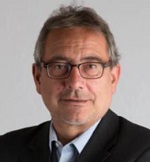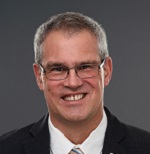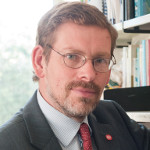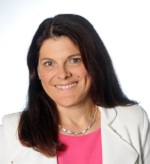New Management at ICC
Since ICC has been founded in 1955 by the Austrian Dr. Friedrich Schweitzer, the Association introduces again a President from Austria, Dr. Gerhard Schleining.
President Elect and thus designated President for the period 2024-2025 is the food chemist and lipid expert Dr. Bertrand Matthäus, Head of the Institute for Safety and Grain in Detmold at the renowned Max Rubner Institute in Germany.
The ICC General Secretariat in Vienna is managed by Veronika Haslinger, Secretary General.

Gerhard Schleining
ICC President 2022-23
Dear members of the ICC-Family,
I am very honored to have started my service as ICC president by 1st of January 2022. ICC seems to be somehow a destiny in my life. I was born the same year as ICC was founded. During my studies of food and biotechnology at the BOKU (University of Natural Resources and Life Sciences Vienna) I came in closer contact with ICC. Besides my doctorial study on Textural Properties of Sponge Cake, I maintained for example the website of ICC for several years and was involved in the digital development of the ICC dictionary. In an EHEDG working group I was involved in the development of guidelines for the hygienic design of equipment for dry materials handling.
During my employment at the Department of Food Science and Technology of the BOKU University from 1983-2020, my research and teaching areas were food physics, with special focus on rheology, food texture and structured delivery systems and quality and safety of food, with special focus on quality management systems and hygienic design. I had several stays for research and teaching at universities in California, China, France, Kasachstan, Thailand, Turkey and Vietnam. I was also external evaluator for EU funded projects, for Food Study programmes and for PHD projects at different Universities and I was coordinating an international master program “Safety in the food chain” at BOKU for several years.
With BOKU I participated in the EU projects HEALTHGRAIN, where ICC was also partner, and MONIQA, which was coordinated by ICC. Further I could gather experiences in projects like TRACK_FAST, TRAFOON, ASIFOOD, ASKFOOD, SMARTCHAIN, NEXTFOOD, POSTHARVEST, FOODAWARE, FNS-Cloud, etc. I coordinated also 2 Erasmus+ projects, FooD-STA, a Food Studies and Training Alliance between the food industry and universities in Europe and SEA-ABT, a capacity building project to establish an Academy of Beverage Technology in South East Asia. These experiences related e.g. to project management, education and training and to innovative teaching methods I am happy to bring in to ICC.
Besides experiences in projects I will also bring in my experiences and contacts in international organizations and networks like the ISEKI-Food Association, where I was Secretary General for 15 years. I am also member of the executive committee of GHI (Global Harmonisation Initiative) and member of EHEDG, the European Hygienic Equipment and Design Group, where I am member of the working group on training and education and chairing the regional section Austria.
ICC went through a difficult time during the pandemic. Conferences had to be postponed or held online. And the world has changed and the cereal sector will have to face also new challenges related to climate change, supply chains, digital transformation, technical innovations, sustainability, just to name some buzz words. With the team in the headquater we started already to re-evaluate the strength, weaknesses, opportunities and threads. And we will continue this with ICC officials and members. A first activity will be to approach the ICC members one by one to collect their needs and expectations.
I believe education and training is the key to master future challenges. Therefore, besides the enrichment of the well-established conferences with new formats, a focus could be on the support of cereal related initiatives and to facilitate knowledge transfer between academia and business, in both directions, using different tools and also to support symposia, “hands-on” workshops in member countries, involving the ICC members.
Looking forward to meeting you all!

Bertrand Matthäus
ICC President Elect 2022-23
Dear colleagues of the ICC,
It was a great pleasure and honor for me to be elected by you as president-elect in December of the last year. I have not been immersed in the field of cereal science and technology for that long, but I have been aware of the importance of the ICC in this area for a very long time through my work in the Department for Safety and Quality of Cereals of the Max Rubner-Institut. In August last year I was appointed head of this institute, which has a long tradition in the field of cereals, with a number of outstanding scientists over the last 70 years. This tradition on the one hand and the importance of the ICC for the work of our department on the other hand were motivation and incentive for me to be involved in the ICC.
My scientific background is in Food Chemistry and after I received my PhD at the Westphalian Wilhelms-University at Münster, Germany in 1993, I started my employment at the Federal Research Institute of Cereals, Potatoes and Lipid Research, the successor institute of the Department of Safety and Quality of Cereals. Here the main area of my research work was on lipid science. However, since cereals have always been an important part of our institute, I have had intensive contact with various research questions also from this field. One of the most important topics was the work on the mitigation of acrylamide in cereal-based food with which I have been working for 20 years. Since my appointment as deputy director of the institute in 2016, my contact with cereals has become even closer. This gave me an insight into various research projects on cereals, in particular the influence of climate and variety on baking quality, rheological measurement methods or the development of baking trials. One important task of our institute is the Special Quality and Harvest Survey (BEE), which is carried out every year on behalf of the Federal Ministry of Food and Agriculture.
In the area of edible fats and oils I have an extensive network of national and international research groups and over the last 20 years I had some short-term research stays in China, Vietnam or Canada. In several national and international projects, I worked together with the industry but also partners from different parts of the world to evaluate and improve the quality of frying oils, cold pressed rapeseed oil or argan oil, to mitigate contaminants in edible oils or to develop new fat phases (oleogels) for the application in foods e.g. bakery products.
I have come to appreciate the importance of working in a scientific association like ICC over the past 25 years through my memberships in the German Society for Fat Science (DGF) and the European Federation of Lipid Science (EFL). I have been on the board of the DGF for 7 years, so I am familiar with the work in the decision-making bodies of such associations. During this time, I was able to get to know the importance of the work on the board of a scientific society. Within the DGF I have gained long-term experiences in the organisation of national and international symposia, workshops and seminars in the field of lipid research to transfer knowledge from research into practice. I think that this is also an important aspect in ICC and I guess that I also bring this experience to my work at the ICC.
I look forward to my work with ICC, my colleagues on the Board, but especially with the members of ICC, and I think that together we can make ICC strong for the changing challenges of the future. This we will achieve by strengthening scientific exchange across the globe and thus helping to identify and address the important research issues of the day.
Looking forward to meeting you all!

Charles Brennan
ICC Past President 2022-23
Charles Brennan is currently Executive Dean, School of Science. STEM College at the RMIT University, Australia.
His research focused on the role of cereal carbohydrates and proteins in relation to cereal utilisation and human nutrition. Throughout his illustrious career Professor Brennan has been a strong advocate for cereal utilisation. He conducted his PhD at Kings College London on the genetic origins of wheat starch gradual proteins and their relation to milling properties of wheat and end product utilisation. His pioneering work on puroindolines / friabilins in the early 1990’s formed the building block of our current understanding of how starch and protein deposition during grain fill can dictate the functionality of cereal grains. He was awarded the honour of Fellow of the Linnean Society of London in 1993 for his efforts in determining the genetic origins of puroindoline materials in ancestral wheat varieties and their impact in the breeding patterns of modern-day wheat.
Throughout the subsequent 20 years, Professor Brennan has been at the forefront of understanding how cereal starch, fibre and proteins affect the viscosity of cereal food products (bread, biscuits, pasta and extruded products) and has used multidisciplinary skills to determine the role of cereal components in manipulating the texture and sensory quality of foods. This has been recognised by the fact the Professor Brennan has been instrumental in research within the food industry and many of the main food production companies. He has also been a keen advocate in terms of understanding the nutritional impact of cereal foods and how by altering the structure of starch and proteins we can manipulate their digestibility and modulate glycaemic reactions in aiding treatment for diabetes and more recently Alzheimer’s disease.
He published more than 200 refereed journal articles, books and conference papers.

Veronika Haslinger
ICC Secretary General
The Headquarters and General Secretariat based in Vienna is managed by Veronika Haslinger since November 2021. The Austrian graduate of the University of Natural Resources and Life Sciences Vienna (BOKU), specializing in plant protection and microbiology with a stay abroad in Italy, can look back on extensive experience in management and network development.
She worked for the Lower Austrian Food Cluster for many years, sometimes in a leading position, and developed, accompanied and managed extensive, innovative cooperation projects along the entire food value chain and moderated their working groups and output events. This was accompanied by intensive contacts with key institutions in the food industry at home and abroad.
Her focus was particularly on issues relating to the grain and baked goods industry. In her role as quality and project manager for a state organic seal, she deepened the industry focus and brings extensive insight into standard development and its communication to the ICC.

